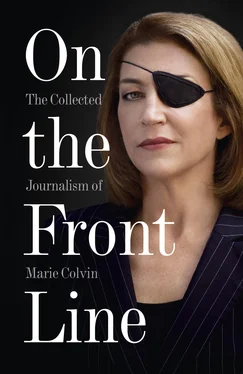1 ...8 9 10 12 13 14 ...25 Baghdad is normally a bustling city. Although its glorious antiquity was long ago buried under drab concrete, its spirit was irrepressible, even at the height of the first war in the Gulf, when taxis returning from the front with coffins on their roofs raced among the fierce traffic on its highways. To see the city now was chilling.
Many middle-class families had closed their homes and left to stay with relatives in the country after the failure of the talks in Geneva between Tariq Aziz, the foreign minister, and James Baker, the American secretary of state. Others held out, fiddling for good news between the BBC, Voice of America and the pan-Arab station, Monte Carlo.
They had heard the ominous tone in Saddam’s speech on Friday to an Islamic conference in Baghdad. They had heard Joe Wilson, the American chargé d’affaires, dramatically announce as he left on Saturday: ‘This is the last flight out.’ They knew most western diplomats had left with him.
But even illiterate taxi drivers held an irrational faith that Javier Perez de Cuellar, the United Nations secretary-general, might be able to avert war when he arrived to see Saddam at the weekend. ‘Maybe Saddam will leave Kuwait,’ the taxi driver said as he drove me to Perez de Cuellar’s news conference at the airport. When the secretary-general said ‘only God knows’ if there would be a war, it was the last straw. Iraqis knew Saddam was ready to take on the world.
Everybody was jumpy. We lost our way leaving the airport and when we drove up to a checkpoint to ask a soldier for directions, there was an audible click as he flipped the safety catch off his AK-47 and walked up to the car with the barrel pointed through the window.
There were many poignant moments in those days overshadowed by the deadline. The most striking thing perhaps, to somebody who had been visiting Iraq on and off since the crisis began, was the sudden openness of the usually careful and closed Iraqis.
This is a society that usually keeps its head down and offers no political opinions. Most dissidents are dead or in exile. The tiny middle class would, in general, be glad to see Saddam’s regime fall; but the merchants did well out of the war against Iran and reached an accommodation with those in power. The urban poor, who have enjoyed cheap, and even free, housing and subsidised food under Saddam, are compliant to his will. The long war against Iran united society and now I found that his stand against the world was filling many Iraqis with pride as well as fear.
After seeing Hussein in the souk hours before the deadline expired, I went into the Al-wiyah club with Falah, an Iraqi businessman. It is a former British club now frequented by Iraq’s elite, a place of contrasts. A huge Saddam portrait greets arrivals in the club car park, but members still leave their own private bottles of whisky behind the bar, their names printed on them, in the old British club tradition. We were the only customers, but there was still food, some salads and chicken.
Falah spoke over dinner about statistics, trying to put on a brave face that Iraq would somehow continue. He had been helping as a consultant to the government in what he called ‘food security’ since the crisis began. He had managed to cut sugar consumption by 60% by closing down ice-cream and confectionery shops; Iraq was now making its own liquid sugar from dates. Farmers had had to kill most of Iraq’s chickens because of the shortage of grain, but cows had been switched to grass and still gave milk. Wheat was a problem; Iraq produced 4 million tons annually and consumed 6.5 million but increased subsidies for farmers would make up much of the shortage. Meanwhile, rationing filled the gap: his office had made charts of human consumption, added 20% and produced rationing amounts and distributed coupons.
Such statistics are usually impossible to come by; but I had barely the energy to commit them to memory (you don’t take notes in public in Iraq). Falah relaxed, dropped his beloved subject and lapsed into tales of his childhood.
The club was significant to him and to the current situation. He had come here first as a young and proud university student, the first Arab of his generation to visit it, brought by a British professor as a reward for being number one in his class. ‘You realise for us this is much more than a war between Iraq and America. For us, even for the Arabs who are not with Saddam, it is a struggle for our dignity. The West has humiliated us and we see Saddam as a leader who has finally stood up to the West and said we want our dignity.’
On the way home, I went by the French embassy where André Jenier, the last western diplomat in Baghdad, was preparing to leave in proper French style. He had laid out the embassy’s last French cheeses, pâtés and salamis and served champagne until midnight, when he and his few remaining staff clambered into their cars and drove through the night to the Jordanian border.
At the Hotel Palestine, previously the Meridian but now rundown and shabby after a change from French to Iraqi ownership at the start of the economic embargo five months ago, I stopped at a ‘challenge the deadline’ celebration, an Iraqi version of an end-of-the-world party.
Kadum Al-Sahir, a popular singer, was on the floor amid a group of men who danced and waved Iraqi flags. But most of the rest of the hall was filled with sombre beer drinkers, sitting at their tables without much enthusiasm. Most were government recruits; the only guests who seemed to have paid the 20 dinar ($35) entry price were 10 Palestinians who had come in a delegation from Jordan to show solidarity with Iraq. A wedding party had been recruited to build up the numbers.
I went to bed in my room at the Rashid hotel and waited for the worst.
The Americans had announced that the deadline would fall at midnight New York time, 8am local time next day, Wednesday the 16th. When I woke, a heavy fog had settled across the flat city. For a moment, looking out of the hotel window, unable to see anything but white mist obscuring the skyline, I thought perhaps the attack had come and I had slept through it.
Downstairs, among the government ‘minders’ who watched the comings and goings of the few of the 40 or so journalists left at the Rashid hotel, there was premature euphoria. ‘You see, I told you there would not be war,’ said Karim, one of the men from the information ministry.
Baghdad thought otherwise. Driving around town, I saw only a few knots of men in quiet discussions. Rashid Street, the main thoroughfare, lined with colonnaded mock-Ottoman buildings from the 1930s, was usually packed with cars. Instead, it was a wide deserted avenue at 9am.
Windows were taped over against bombs for the first time. The Mandarin restaurant on Karada Street, once Baghdad’s busiest fast-food joint but closed for months because of a ban on serving meals, had its wide windows taped in large Xs. At the Shorjah souk, Baghdad’s most popular market because of its cheap clothing, household items and canned goods, only four of the 200 stores had opened. One man, hanging up flannel robes from the ceiling of his shop, said: ‘We will open for an hour. If it stays like this, we will close.’ Schools had opened, but with few teachers and fewer students they quickly closed for the day.
There was no sign of backing off by Saddam. The headline of the government newspaper, Al-Jumhuriya, said: ‘We shall never compromise on Iraqi and Arab rights.’ Midday television news showed perhaps the unluckiest people in the world that day: 177 former prisoners of war descending from an Iraqi Airways flight to Baghdad after years of captivity in Iran.
Sources were fast disappearing. I telephoned the foreign ministry to try to see Nizar Hamdoun, the under-secretary. But the ministry’s number had changed and its officials had moved to a new location. The last time I had seen Hamdoun, he was sitting in his office, morosely watching CNN television. ‘I feel like I’m watching a bad fiction movie,’ he had said.
Читать дальше












